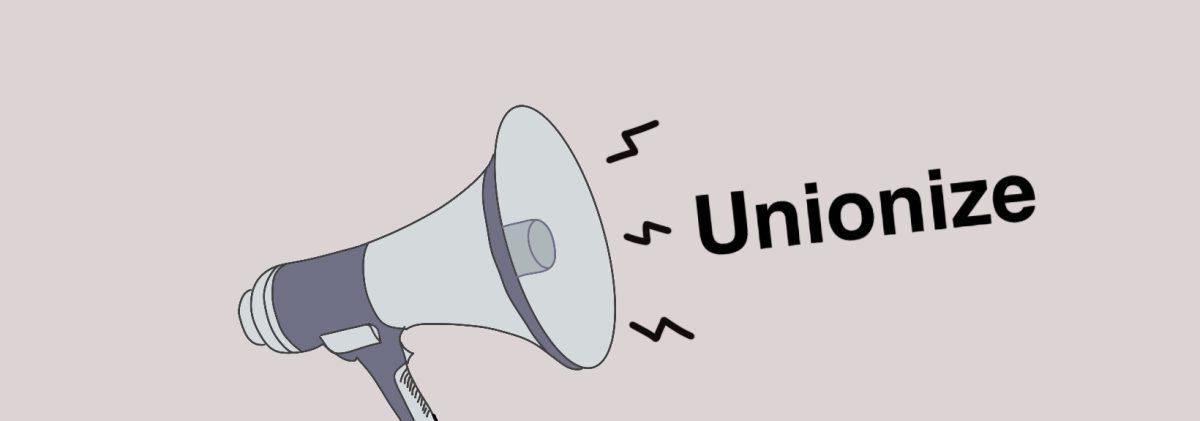
If you’re reading this, it’s likely in your best interest to care about unions, even if you’re conservative or apolitical. Many students who don’t have work experience may find themselves removed from the issue. However, labor organizing is happening on and around campus, making it vital that you pay attention and care. Many will disregard labor protections as an issue that will never affect them or argue to protect the interests of capital owners. However, there is a collective benefit to be had from a society that uplifts workers, and an economy that does not require exploitation in order to function effectively.Even if you’re not a union member yourself, you likely know someone who is, or have experienced what it’s like to be a poorly compensated, overworked employee. Nursing, mail delivery, teaching, government workers and many more industries are unionized successfully in America.Unions play an essential role in negotiating and enforcing a contract with management that guarantees the workers’ needs are met: These include adequate pay, time off, health care, job security, working conditions and more. If a union is not in place, workers’ efforts to negotiate for their interests can be undermined and overlooked.While the topic of unionization has received much national media attention recently, the impacts are felt locally as well. MU workers across all four campuses organized in August to resist benefit cuts, specifically cuts to time off for workers. The union representing workers in the University of Missouri System, asked prior to the UM System Board of Curators vote in September, to oppose a proposal to cut paid time off for more than 13,000 staff members. Supporting these staff members in resisting these benefit cuts is relevant to students as well, as these people are members of our community and these decisions affect our local economy.Workers have been able to organize recent workplace strikes at Taco Bell, Starbucks and other establishments in Kansas City to get better treatment. Nationally, railroad management and unions came to a recent tentative agreement, avoiding a threatened rail strike that would have had detrimental economic effects. According to CNN, the unions represented more than 50,000 engineers and conductors, negotiating better pay and improved time off from the deal. Unions prove to be successful in negotiating improved conditions and pay for workers.There’s been a rise in union successes lately due to the current strength of the labor market, which has afforded workers more bargaining power. A spotlight is shining on workplace injustices and organized attempts to resist them. Now more than ever, it is essential that rising generations support a labor-empowered future.Unions are the most effective way of pushing back against wage theft and unfair working conditions. The United States currently does not have a strong labor movement, making it even more important that young people promote a pro-union attitude and are committed to organizing in their workplaces so union coalitions can be built. This is especially important in a state like Missouri, where politicians advocate for union busting and working conditions are often poor. Even with the negotiating power of their Local 955 Union, UM system employees in food service and facility operators struggle to advocate for their interests.
.The right to unionize and organize in the workplace is essential to resisting exploitation and poor conditions. Supporting workers’ rights rather than a corporate narrative will promote a more fair economy that prioritizes more than the interests of capital owners and shareholders. Workers are already placed at a disadvantage when negotiating with their employers. The right to organize gives power back to employees and often allows demands to be met rather than overlooked, as they would be when negotiating individually.
CORRECTION: This column contains an inaccuracy in the sentence “Even with the negotiating power of their Local 955 Union, UM system employees in food service and facility operators struggle to advocate for their interests as the university threatens to combine sick and vacation days.” As of September 7th, the MU Board of Curators voted in the affirmative to transition to the new paid time off system which combines sick and vacation days. At the time of the posting of this article, the university had already voted, making the claim that they “threatened to combine sick and vacation days” factually inaccurate at the time of publication.*
*A previous version of the article posted incorrectly stated that Missouri is a right-to-work state and mentioned benefits being cut which were non-existent under the old paid time off model. These inaccuracies have been edited and removed from the column.
Edited by Ezra Bitterman | [email protected] edited by Sam Acevedo and Jacob Richey | [email protected]